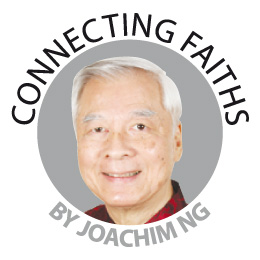THESE coming days present momentous opportunities for the Sikhs and Christians to share a common theme underlying their religions. Vaisakhi, falling on Sunday, April 14, celebrates the founding of the Sikh community known as Khalsa. Exactly one week later, Christians celebrate Easter as the foundation day of their faith.
The customary practice in Malaysia ever since the nation’s founding is for each community to celebrate its own holy days without needing to ask: who else is celebrating around this time, and do they have a similar theme? Slowly Malaysians have been pulling apart, following the drift of faith communities in distancing themselves from one another on grounds of differing beliefs.
But today we are forced to ask a troubling question: what is the ultimate consequence of drifting apart? The less we know each other and the less we celebrate together, the more our lives are put at stake. In Christchurch, New Zealand, on March 15 a hate-filled gunman provided appalling live-streamed views of the devastation awaiting humanity if we fail to build a common base. The mass killer has no previous criminal or psychiatric record and is well-travelled, but consumes anti-pluralist hype spewed over the internet.
Isn’t it bitter irony that the fundamental commonalities embedded in all religions are ignored, and supremacist thinking is promoted instead of discouraged? April is indeed a timely month to spread the knowledge that Sikhs and Christians, who are celebrating their holy days, share a common aspiration for peace through sacrificial contributions.
Sikh volunteers are renowned for taking part in disaster-relief operations, lending non-partisan help unconditionally, and they were there at Christchurch to help grief-stricken families of the 50 people shot dead while at prayer. Christians have a century-long history of providing modern education in Asia through the sacrificial teaching lives of dedicated Catholic, Anglican and Methodist groups. Most of their students were non-Christians who remained non-Christian throughout.
Where did Sikhs and Christians learn to imbibe this spirit of sacrifice? They learned it from the founders of their faith – the 10 Gurus and Jesus – who set peace, unselfishness, and reconciliation as the primary goals of society. In the Sikh scripture, the Sri Guru Granth Sahib, you find these words: “He who dies to his self and so dying, lives” (p332 Gauri). A near-identical verse exists in the Christian scripture, the New Testament: “If you live according to the flesh, you will die; but if by the Spirit you put to death the misdeeds of the body, you will live” (Romans 8:13).
Broad similarities existed in the political circumstances surrounding the lives of Jesus Christ and Tegh Bahadur, the ninth Guru of the Sikh faith. Both men had the extraordinary valour to challenge highly repressive elites.
Guru Tegh Bahadur defied Mughal emperor Aurangzeb who was bent on destroying the religious pluralism of Indian society; Jesus shamed the powerful Roman-favoured Jewish temple clique for its inhumane disregard of the common people. Both could sense the fate that awaited them, and both were cruelly executed.
Guru Tegh Bahadur gave his life for peace and pluralism; Jesus gave his life for peace and humanism. Without pluralism and humanism, there can be no peace in society. The Christchurch gunman’s utter rejection of pluralism and his total lack of humanism shattered the peace on earth that day.
Religious pluralism does not mean to let error flourish; it’s a heinous mistake to assume that this is the meaning. Pluralism means to let truth flourish through diversity. Pluralism is not unbelief; ego-driven intolerance of diversity is the real unbelief. If we die to ourselves we live; if we live for ourselves we die. In both the Sikh and Christian scriptures, living for ourselves means letting the ego drive our lives. Dying to ourselves means crossing out the ego.
In so dying to yourself, you experience a resurrection to new life. This is the inner meaning of Easter resurrection – a metaphorically true story and psychologically profound experience.
On Vaisakhi, Sunday, April 14, and on Easter, Sunday, April 21, may people of all faiths vow to raise up their lives together as one humanity without supremacist contention.
The writer, a former journalist, champions inter-faith harmony. Comments: letters@thesundaily.com











